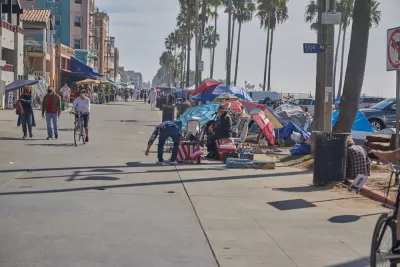Challenging common misconceptions about unhoused Californians with data.

An article for CALmatters by Marisa Kendall uses data to dispel six common myths about homelessness that don’t hold true.
While some blame California’s severe homelessness crisis on migration from other states, the data don’t bear that out: “The vast majority of people who are homeless in California are from California — and most are still living in the same county where they lost their housing, according to a recent large-scale survey of unhoused Californians conducted by the UCSF Benioff Homelessness and Housing Initiative.” The survey found that 90 percent of respondents lived in California when they lost their housing, and 66 percent were born in the state.
The misconception that most unhoused people are experiencing addiction or mental illness is also unfounded. While rates of mental illness and addiction are higher than in the general population, they do not account for a majority of people experiencing homelessness.
The article also explains the complicated process of getting temporary shelter or housing. There are a host of challenges that prevent people from accessing shelter. According to Nicole Fiore, part of the team that worked on a state report on Project Roomkey, “People will come indoors if they are offered autonomy, safety, privacy, if they’re able to keep their partners, their pets, their possessions.”
Understanding the root causes of homelessness and the challenges unhoused people face is crucial at a time when the Supreme Court opened the door for more punitive measures and criminalization with its ruling on Grants Pass v. Johnson.
FULL STORY: 6 myths about homelessness in California

Maui's Vacation Rental Debate Turns Ugly
Verbal attacks, misinformation campaigns and fistfights plague a high-stakes debate to convert thousands of vacation rentals into long-term housing.

Planetizen Federal Action Tracker
A weekly monitor of how Trump’s orders and actions are impacting planners and planning in America.

Chicago’s Ghost Rails
Just beneath the surface of the modern city lie the remnants of its expansive early 20th-century streetcar system.

Bend, Oregon Zoning Reforms Prioritize Small-Scale Housing
The city altered its zoning code to allow multi-family housing and eliminated parking mandates citywide.

Amtrak Cutting Jobs, Funding to High-Speed Rail
The agency plans to cut 10 percent of its workforce and has confirmed it will not fund new high-speed rail projects.

LA Denies Basic Services to Unhoused Residents
The city has repeatedly failed to respond to requests for trash pickup at encampment sites, and eliminated a program that provided mobile showers and toilets.
Urban Design for Planners 1: Software Tools
This six-course series explores essential urban design concepts using open source software and equips planners with the tools they need to participate fully in the urban design process.
Planning for Universal Design
Learn the tools for implementing Universal Design in planning regulations.
planning NEXT
Appalachian Highlands Housing Partners
Mpact (founded as Rail~Volution)
City of Camden Redevelopment Agency
City of Astoria
City of Portland
City of Laramie





























